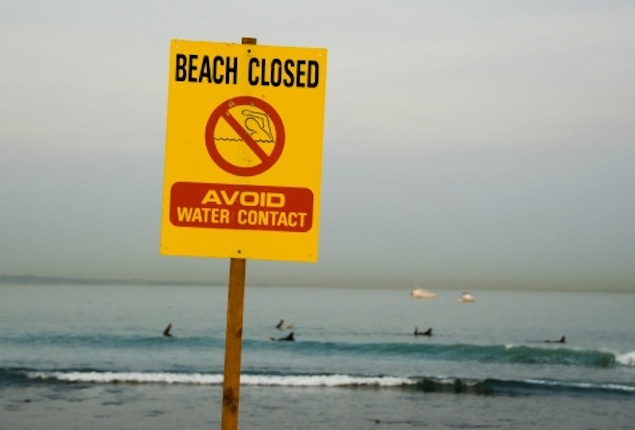
Surfers concerned with water quality can join Surfrider’s Blue Water Task Force. Photo: Surfrider Foundation
The Surfrider Foundation’s volunteer-run Blue Water Task Force has compiled their second annual report, addressing the issue of water quality by conducting 2,740 tests at both marine and freshwater beaches. The measured bacteria levels are compared to federal water quality standards established by the Environmental Protection Agency to protect public health in recreational waters. From the second annual report, 70% of the tested beach water samples met national water quality standards.
However, a main finding of the report showed that 18% of the water test results showed high bacteria levels, indicating fecal contamination and the presence of disease causing organisms.
Another main finding of the report was that growth in monitoring programs like the Blue Water Task Force helps identify water pollution problems and minimize high bacteria levels. In just one year, 42% more tests were conducted, proving that more volunteers had been educated about water quality.
To complete the testing, community and organizational members use funding from the Beach Grants Program, which totals $10 million. However, in Fall 2012, Obama’s administration proposed to eliminate funding for the Beach Grant Program. After enlisting support from the senate, Surfrider’s efforts postponed the cut of federal funds.

Surfrider Foundation’s Blue Water Task Force Conducts Water Quality Testing. Photo: Surfrider Foundation
Now, the 2014 budget is proposing to make these cuts again.
If the funding is cut, fewer tests for bacterial levels will be conducted, resulting in less awareness of when the ocean water is dangerous to enter. Mara Dias, the Surfrider Foundation’s Water Quality Manager, said:
“Unfortunately, the reality is that some states rely entirely on the federal grants to support their beach programs, so these states may stop their beach water quality monitoring altogether. Many other states will likely test less often, use less safe standards, or could drop monitoring completely during the offseason, when surfers tend to dominate ocean use.”
Dias continued to explain that there will be an immediate concern of people contracting illnesses by being exposed to pollutants when the water quality is unknown.
Additionally, the procedure for beaches with high bacteria levels is to immediately close them to the public and resample the water. As soon as a low bacteria reading is maintained, the beach will open again. If the Beach Grants Program is cut, another consequence would be longer beach closures because states will not have the capacity to find a solution as quickly.
So far, 17 U.S. senators and 30 other non-government organizations have signed letters detailing their support for water testing and keeping the Beach Grants Program. The public can show their support by getting involved with Surfrider’s Blue Water Task Force or two similar Surfrider programs – Ocean Friendly Gardens and Know Your H2O.
Ocean Friendly Gardens educates and assists people to prevent pollution and runoff in their yards. The method is simple and allows rainwater to soak into the soil, which filters out pollutants that could go to waterways and the ocean. Ocean Friendly Gardens also reduce flooding and erosion, and provide plants a source of water to draw from during dry periods.
Know Your H2O educates communities on how to conserve water resources. To begin learning, Surfrider has created an animated movie “The Cycle of Insanity: The Real Story of Water” to explain the various challenges and solutions relating to water management.

